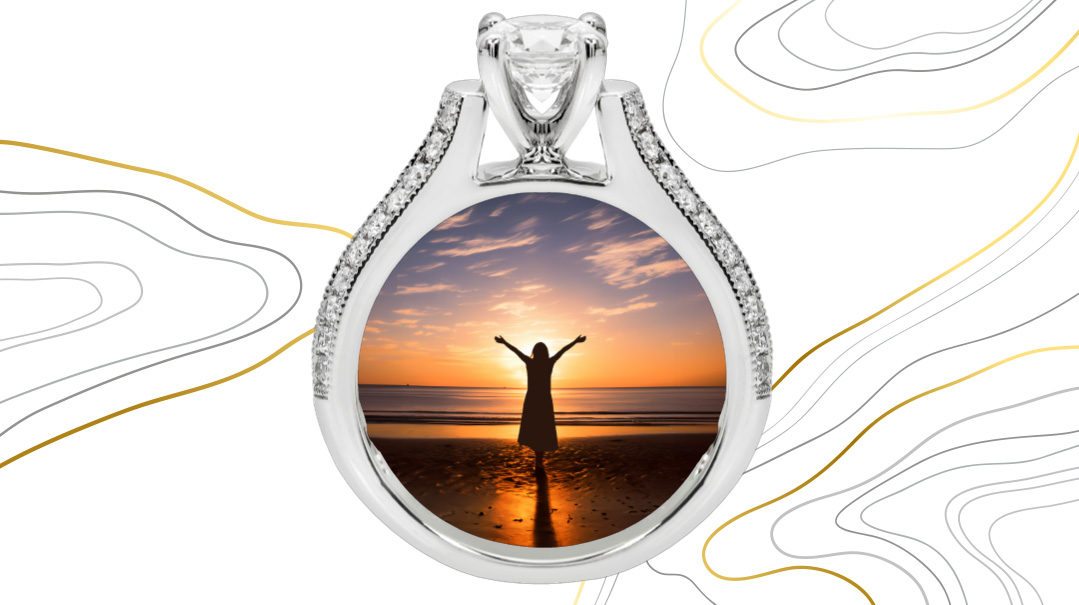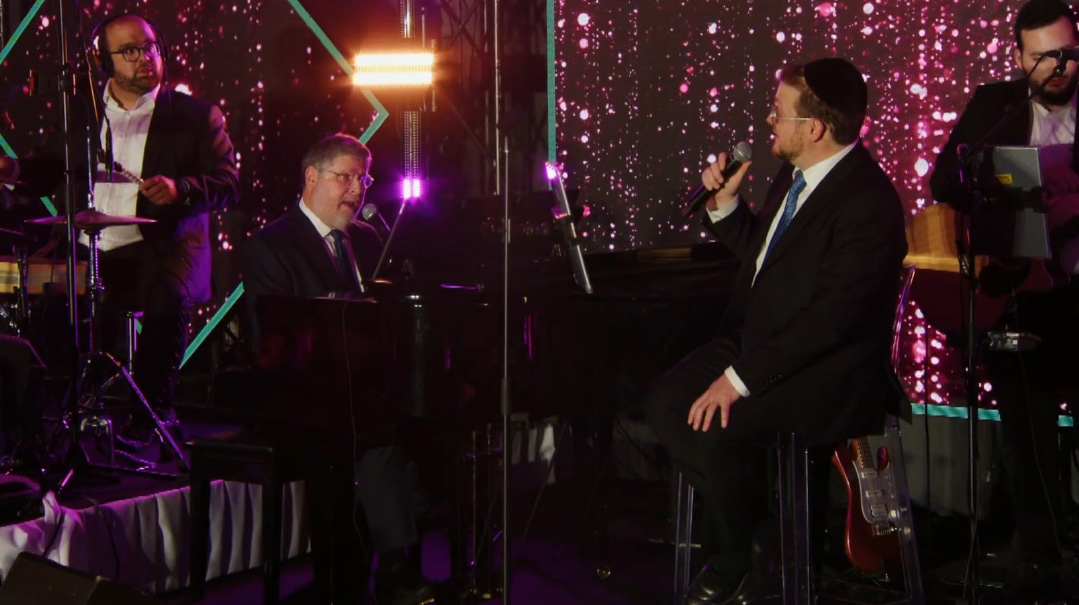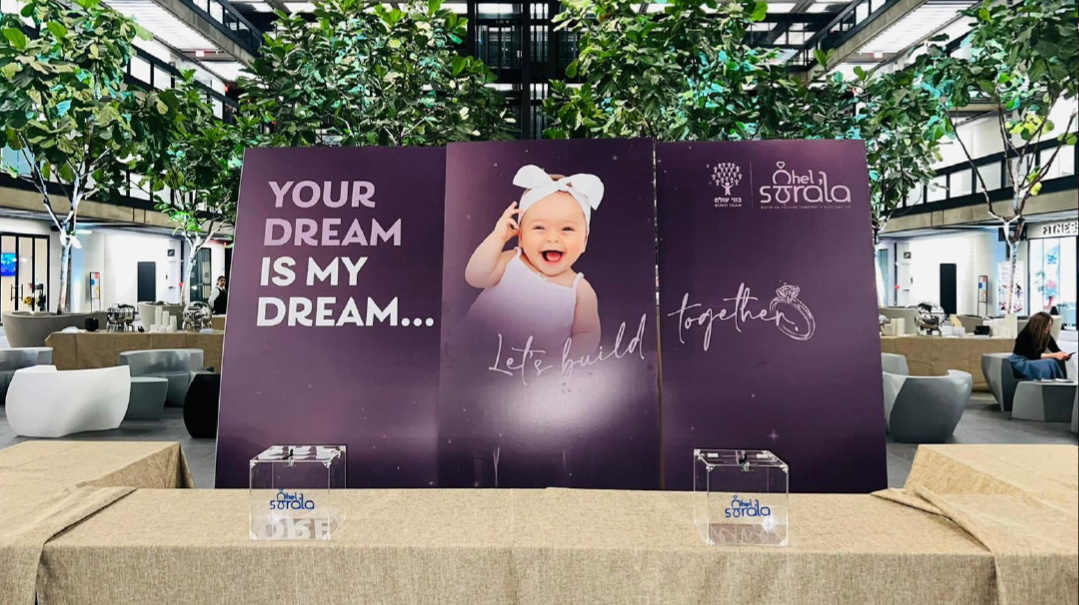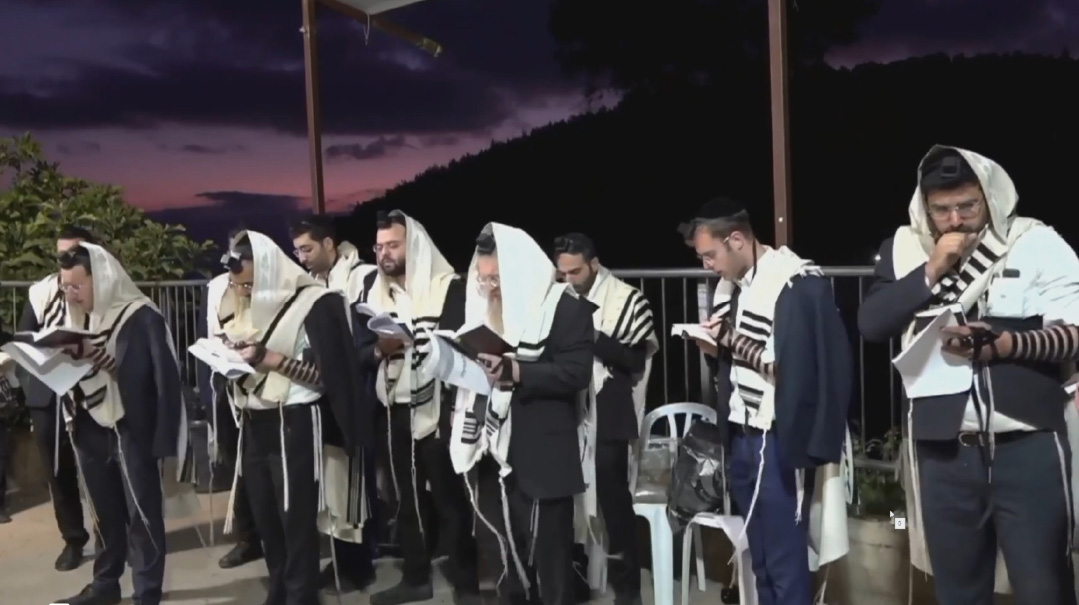Hoping Together
| July 4, 2023At the conclusion of 40 days of reciting Nishmas as a group, 1,800 women joined together for an evening of inspiration, tefillah, and song

Hoping Together. The tagline of Ohel Sarala’s Journey to Amuka program pops out at me as I walk up the steps to the grand Bell Works building. They couldn’t have chosen a more apropos title, I think, as I take in the throngs of people making their way into the hall. They’re expecting 1,800 attendees, and it looks like the crowd is made up of women of all ages and backgrounds. Most are members of Ohel Sarala, an organization cofounded by Bonei Olam’s Rabbi Schlomo Bochner and Rabbi Chaim Aryeh Zev Ginzberg, in memory of Rav Ginzberg’s daughter. Ohel Sarala pairs up single women with married couples who are struggling with infertility, and has each daven for the other.
Many of the event’s attendees have spent the last 40 consecutive days reciting Nishmas and have joined together on the final day, the yartzheit of Rabi Yonasan ben Uziel who is buried in Amukah, for an evening of inspiration, tefillah, and song, to be followed by a livestream of tefillos at Amukah itself.
Inside the building it’s dark, the ballroom lit up by only the tall LED pillars dotting the room and the stage lights at the front. But there’s a palpable warmth, achdus, and energy, and I soak it all in.
One of the earlier speakers, Rabbi Gavriel Friedman, or Rav Gav as he’s popularly known, shares an idea he’d heard from one of his Israeli neighbors about parshas Shelach. “ ‘Mah habaayah im hameraglim — What was the problem with what the meraglim did?’ my neighbor asked. ‘The problem was that they didn’t look at things positively.’ What does it mean that they didn’t look at things positively? People say it all the time, ‘Don’t worry, just look at things positively…’ as if that ever helps. I mean, like, thank you so much, now everything is great. But my neighbor went on to explain that positive isn’t really an English word, it’s a Hebrew word that’s an acronym for Poh Zeh Tov. This here, right now, is good! Think to yourself, is it possible that Hashem knows more than I do? He loves me more than I could imagine, and only wants the best for me… so, if this is happening, it must be that Poh Zeh Tov, that it’s good.”
He gives a mashal of a five-year-old boy who got on a bus and stood behind the bus driver. “The boy begged him, ‘Nahag, can you please crash the bus?’ ” says Rav Gav. “Of course, the driver said no. But as the boy persisted, the driver finally asked him, ‘Why would you want me to crash the bus?’
“The boy replied, ‘Because I’ve heard so much about bus crashes, and I’ve never seen one before. I want to see what it looks like!’ How many of us have said to Hashem, ‘Please Hashem, can you just do this for me?’ And we beg and we cry… for Hashem to crash the bus. Hashem says, ‘I’m sorry, but I’m not going to do it. Even though it’s hard for you and even though you don’t get it.’ ”

Full Circle
When Rabbi Ginzberg gets up to talk, he begins by emphasizing the importance of tefillah and how nothing in this world happens without it. “Everybody in this room, their zivug is here,” he proclaims. “Forty days before you were born, HaKadosh Baruch Hu prepared your zivug, He just wants some tefillah to bring it forth, to bring a simchah to each one of you.
“Right before I got up to speak, someone told me she’s been davening three times a day for the past nine years for her zivug, and Hashem still hasn’t sent her a yeshuah. Only Hashem can explain that, but never for a moment should you think that tefillah doesn’t have the power to turn your world and the entire world upside down in moments. I’m telling myself and everyone else in this room, Never stop davening.”
When Abie Rottenberg of Journeys fame introduces a new song he wrote in honor of Ohel Sarala, he explains, “On one of our Zoom meetings discussing the song list for the evening, Rabbi Baruch Goldberger, Ohel Sarala’s director said to me, ‘There are single women who have a tainah on you because the song, “The Shadchan” from Journeys One only presents the boy’s perspective. Maybe you should do something about that?’ I agreed with him and went ahead to create a ‘girls’ version.”
Then he plays the song, and we’re in stitches.
Leah Weinstock, a former Ohel Sarala member who got married three weeks ago, steps onto the stage. I perk up as she describes what Ohel Sarala meant to her during her single years and the incredible joy she felt when she heard that the couple she’d been davening for had a baby. Then the emcee interrupts with a, “There’s a surprise coming through the side of the stage.”
We watch as Leah stands with her mouth agape as her tefillah partner, Adina Kaplan, who’d come in from Yerushalayim for the event, walks onto the stage holding her baby. There’s not a dry eye in the room as the two embrace.
“For me, it was the highlight of the evening,” says Rabbi Ginzberg afterwards. “It was an incredible moment, a real kiddush Hashem.”
Adina Kaplan shares her backstory with us, the audience. “I got married in July of 2019. A year after we got married, my husband and I realized that building a family was going to be a struggle. I knew about Ohel Sarala because I actually went to school with Sarala Ginzberg, and I remembered her warm personality and had heard about the program that was created l’illui nishmasah. I thought there was something so beautiful about strangers davening for each other. After I lit candles each week, I sat alone in my apartment, and I davened for my Ohel Sarala girls. Our situations were different, yet I felt so connected to them. While you’re going through it, it seems endless. Everyone around you is moving on. You start to wonder, will my time ever come? Then you reach a point where you throw up your hands to Hashem.”
“We were so happy when we hard Leah had gotten engaged! And when we came to America for Pesach, I felt compelled to attend her wedding, even though we’d never met before. I walked into the hall and just looked out for the girl in the white dress. It was amazing to see how happy and radiant she was! When the kallah’s mother asked me who I was, I answered, and her jaw dropped to the floor. She ran over to tell her daughter, and in the middle of the dance, she came over and hugged me. She held my baby and introduced me to her family. Leaving the wedding that night, I felt like we’d made it. There were so many yeshuos!”
The final speaker is Mrs. Charlene Aminoff, who tells a story she’d just heard backstage. “A young woman approached me a few months ago and told me that when she’d first heard about the segulah of saying Nishmas to find a zivug, unrelated to the Ohel Sarala program, she joined a group of people in saying the tefillah for forty days. Forty days came and went, and there was no chassan in sight. She approached me, discouraged that nothing came out of it, and I encouraged her to start another cycle. She just told me that on the fortieth day of her second cycle, she went on the first date with her now-chassan!” she finishes with enthusiasm.
But not everything turns out the way that we want it to, says Charlene, “When you stay in a positive mindset, that’s when you begin to pass the tests. The next time you feel like complaining, thank Hashem instead! When we rise above our nature and serve Hashem in the way that He deserves to be served, we create a middah k’negged middah effect, and Hashem will then give you real reasons to thank Him.”
Towards the end of the evening, an all-women’s band steps onto the stage, giving us a chance to sing along. Chayala Neuhaus and Mindy Blatt sing a beautiful song on emunah they composed especially for the evening. As the tempo rises towards the end of the night, so do we, and everyone in the room joins together, dancing and feeling just how geshmak it is to be a Yid.

Live From Amukah
At 10:15 p.m., vasikin time in Eretz Yisrael, a special minyan gathers in Amukah to daven for the Ohel Sarala girls. Last minute, after realizing there’s no reception in Amukah, the Ohel Sarala staff had arranged for a satellite to be built so we’d be able to join the minyan live. As the sun rises over the hills in the livestream background, we join them in saying a few perakim of Tehillim together.
One girl comments afterward, “Watching the men davening for us with such kavanah, swaying with talleisim and tefillin, gave me such chizuk. It showed me how much Klal Yisrael cares.”
“There is no doubt in my mind that there’s an impact in Shamayim,” Ohel Sarala cofounder Rabbi Bochner says from the stage. “We all have the zechus of being part of something so magnificent.”
Rabbi Ginzburg imparts the same message. “I believe the malachim haven’t stopped dancing since the shabbaton we held in January for single women. The achdus and connection these programs generate are something that can only be experienced.
One member of the audience tells me, “I’d been to the shabbaton so I recognized so many faces at the Nishmas event, and at this point, I feel like I’m part of a warm family.”
“There is a lot more in store for Ohel Sarala this coming year,” Rabbi Goldberger tells me, “including some new innovations that will change the landscape for shidduchim.”
It’s now past midnight as I make my way upstairs towards the lobby. I’m no longer noticing new faces, but rather feeling empowered as we all walk together, Rabbi Bochner’s heartfelt words reverberating in my mind: “Rav Steinman told me several times that when someone does something with a full heart for another person, she creates an incredible channel of brachah. We’ve had close to 5,000 engagements from Ohel Sarala, and hundreds of babies born. We see that this segulah works! After tonight, I’m waiting for 1,800 chasunah invitations!”
The Shadchan (from the girl’s perspective)
Abie Rottenberg
I was sitting in my room upstairs as usual
Waiting for the front doorbell to ring
And I took one final look into the mirror
Making sure that everything looked just fine
[Chorus]
’Cuz the shadchan said this time said this time it would be different
I heard those words so many times before
But the family’s nice, believe me this one’s special
I said all right, but only just once more
I can hear the awkward words that would soon be said
When we met one another for the first time
And the feeling would be there that when we walked outside
Of hopeful eyes starting from the window
The restaurant he took me to was elegant
And I hoped not to bump into any friends
And when the waiter came in with our entrees
I prayed he doesn’t eat his with his fingers
[Chorus]
He told me how much he loves his rosh yeshivah
A fact I found to be of no surprise
But then he said he still adores his parents
That he’s close with each one of his siblings
I asked him what he thinks of Jewish music
He said Journeys lyrics make him cry
When I need some chizuk, he said he always turns
To something slow from Baruch Levine
[Chorus]
Now I’m standing in the kitchen as usual
All the kids will soon be home from school
As their mother I’m so tired and exhausted
But happy and so thankful to Hashem
And every now and then my husband says go make a call
To someone looking hard for her bashert
And I tell her about his middos and personality
And that he still has almost all of his hair
[Chorus]
And I said to her this time it will be different
I’ve heard those words before
But the family’s nice believe me this one’s special
She says all right- oh she says all right- but only just once more

The Power of Nishmas
The idea of saying Nishmas as a group of girls started four years ago when the Ohel Sarala organization invited its members to join a program saying Nishmas for 40 consecutive days. A few hundred young women signed up that year. This year the number was 7,000.
The power of saying Nishmas has been well-known for centuries, Ohel Sarala’s director, Rabbi Boruch Goldberger, explains why the organization chose to promote this particular segulah: “I heard from Rav Shlomo Kanievsky that his grandfather, the Steipler, always said Nishmas during times of tzarah and Rebbetzin Leah Kolodesky has been advising girls to say Nishmas for 40 consecutive days.”
(Originally featured in Family First, Issue 850)
Oops! We could not locate your form.






